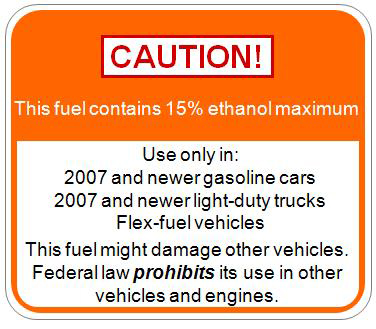
| Tuesday, February 21, 2012 | Archives | Advertise | Online Buyer's Guide | FLEETSolutions |
Sensenbrenner Bill Calls For More Research On E15 Ethanol
 A Wisconsin congressman has once again proposed legislation that would delay the federal government from requiring gasoline in newer vehicles to use 15-percent ethanol. On February 7, the House Science and Technology committee okayed a bill authored by Rep. Jim Sensenbrenner, which calls for more research on the impact that fuels with more than 10 percent ethanol has on motors. The measure passed on a 19-7 vote. A Wisconsin congressman has once again proposed legislation that would delay the federal government from requiring gasoline in newer vehicles to use 15-percent ethanol. On February 7, the House Science and Technology committee okayed a bill authored by Rep. Jim Sensenbrenner, which calls for more research on the impact that fuels with more than 10 percent ethanol has on motors. The measure passed on a 19-7 vote.The Brookfield Republican says he was pleased that the committee voted to "put science before politics" because a decision of this magnitude would impact every American who owns a car, boat, or lawnmower. "We must base our decisions on sound science, not political expediency," Sensenbrenner said. "The Administration has fast tracked E15 without considering that increasing the percentage of ethanol in our gasoline will cause premature engine failure, lower fuel efficiency, and void vehicle warranties. In small engines, E15 is downright dangerous and the EPA has no credible plan to stop mis-fueling. If ethanol is going to be the fuel of the future, then there should be no problem conducting independent, comprehensive scientific analysis of its effect on American drivers." In October, 2010, the EPA granted a partial waiver to the Clean Air Act permitting the use of fuel blends containing up to fifteen percent ethanol, or E15, in cars and trucks made in 2007 or later. The agency expanded that same waiver in January 2011 to include cars and trucks from 2001 and on. Last year, Sensenbrenner wrote to fourteen automakers asking for input on E15. He says all of them responded that E15 will "decrease fuel efficiency, damage engines, and void customer warranties." He also said Chrysler warned that the warranty information provided to their customers specifically notes that use of the blends beyond E10 will void the warranty. Meanwhile, supporters of the higher blend ethanol cried foul this week, saying Sensenbrenner's actions were "politics over science." Renewable Fuels Association President Bob Dinneen issued a statement saying the Department of Energy has already tested vehicles over millions of driving miles and got consistent results. "This bill is a perfect example of Congress trying to address a problem that doesn't exist," Dinneen said. "Understandably, concerns will be raised any time a new fuel is introduced. The concerns raised, however, are largely superficial and do not require the intervention of Congress to resolve. America's ethanol industry has been working with auto companies and fuel suppliers for over a year to address any concerns and misconceptions that persist." He went on to say this bill would reverse the progress private industry has already achieved and threaten the job creation that would stem from an increased use of domestic renewable fuels. In 2011, Sensenbrenner claimed in an editorial that the government has artificially propped up the ethanol industry with a 45-cent- a-gallon subsidy to oil refiners and a 54 cent-per-gallon tariff on imported ethanol, and said the ethanol lobby claimed the biofuel would reduce U.S. dependence on unstable sources of oil and reduce greenhouse gas. Sensenbrenner's new proposal will now be taken up by the House of Representatives. |
 |
NAFA Fleet Management Association 125 Village Blvd., Suite 200 Princeton, NJ 08540 Telephone: 609.720.0882 Fax: 609.452.8004 |








